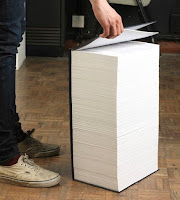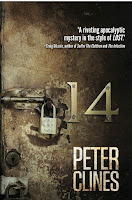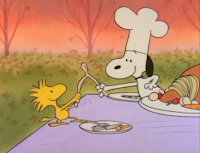And here we are, in the final hours of NaNoWriMo.
I didn’t actively (or even loosely) participate in NaNoWriMo this year. Too much editing to do. But it’s been a productive month, and in a lot of ways that’s what this is all about.
Well, it’s not exactly what it’s all about.
Back at the start of the month, I said “NaNoWriMo” is a bit misleading because we’re not really trying to write an entire novel in a month. We’re trying to write the first draft of a novel in a month. A rushed, mistake-filled first draft at best.
And really… even that’s kind of misleading. Because what NaNoWriMo counts as a novel—a 50,000 word manuscript—is so small most publishers wouldn’t consider it. Even books in what are generally seen as “shorter” genres (like horror, romance, and mysteries, for example) have a low end of around 75-80K words.
So if the goal’s to get an even slightly passable first draft this month, pretty much everybody would fail. I mean, just in general I’m betting most folks who do NaNoWriMo don’t hit that 50K benchmark. That’s a lot of words in one month. Said as a professional who knows a lot of other professionals. It can be done, yeah, but it’s tough.
I’ll also take the next step and say half the folks who do hit said benchmark… well, their manuscripts probably need so much work they’re effectively going to be rewriting the whole thing in their next draft. Correcting. Cutting. Improving. Expanding.
Hopefully they admit they need another draft…
Anyway, this is sounding so let me share two points I hope you’ll take away from this month of manic writing.
First, don’t think of this in terms of winning and losing. Think of it more like one of those mud run/ obstacle course things where the goal is just to get to the end. Yeah, someone’s going to get there first and someone’s going to get there last, but the big thing is getting there, even if it turns out it might take me a little longer than that guy. A friend of mine just did one of those races and she was nowhere near first but she finished the course and she was damned proud. I keep telling myself I want to run a marathon one day, but I’ve got no illusions about ever winning a marathon. I’ll be nowhere near the front of the pack, but I just want to know if I can do it.
So don’t worry about benchmarks or schedules. If you wrote new words this month, you did it! If you managed to write them almost every day this month—damn, you’re amazing. You did something most people just talk about doing.
Second, how much did you write? How many new words got put down? Twenty-five thousand? Thirty? Maybe twenty? Maybe forty?
Y’see, Timmy, what I should take away from this is how many words I wrote this month. because now, for future reference, I know how many words I can write in a month. In a month with a big holiday weekend, no less. Now I know exactly how long it’s going to take for me to finish that 100,000 word first draft. I’ve got a solid, attainable goal, and I know it’s attainable because I just showed myself how much I can write in a month.
So maybe you didn’t write the first draft of a book this month. But you proved you can write it. And if you can write a first draft—even if it takes two or three or six months—that means you can write a book. A finished, polished, ready-to-show-off-to-the-world book.
And that means you won NaNoWriMo. Congratulations!
Next time, I’m going to answer a question from the comments and talk about plotting.
Until then, go write.
And serious congrats again on winning NaNoWriMo.








